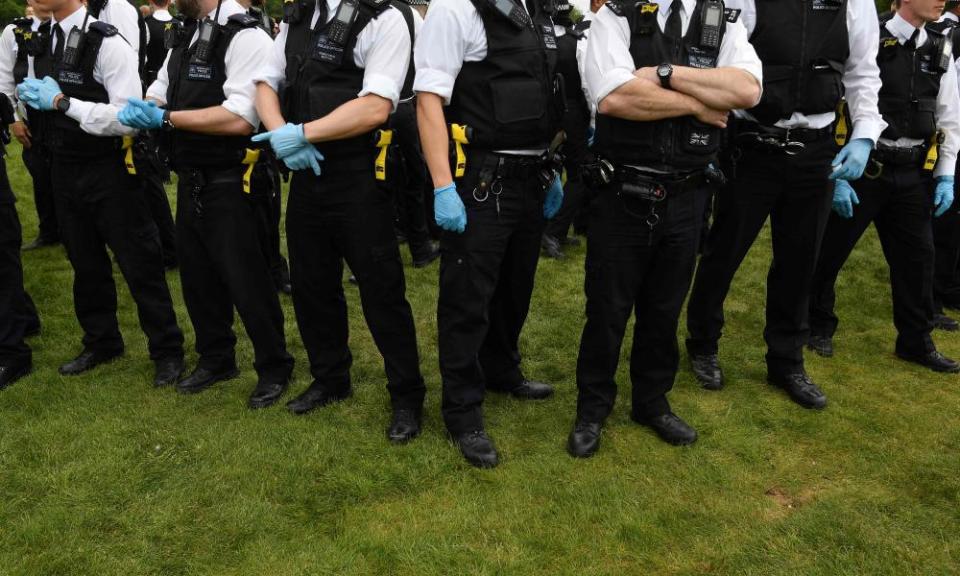BAME people fined more than white population under coronavirus laws

Black, Asian and ethnic minority people in England are 54% more likely to be fined under coronavirus rules than white people, it can be revealed.
Analysis by Liberty Investigates and the Guardian shows that BAME people received as many as 2,218 of the 13,445 fixed-penalty notices (FPNs) under distancing regulations recorded from 27 March to 11 May, while white people were given around 7,865.
The National Police Chiefs’ Council has published data fortnightly showing the racial breakdown of the fines and said on 15 April that the ethnic distribution of penalty notices was proportionate, without acknowledging that a quarter of the fines were to people whose ethnicity was not identified.
BAME people account for 15.5% of the population in England, according to 2016 population figures. BAME people received at least 22% of the coronavirus lockdown fines, according to NPCC data, which was most recently updated on 15 May.
The analysis shows BAME people were fined at a rate of 26 per 100,000, while the rate for white people was 16.8 per 100,000.
Experts and campaigners said the disproportionality called into question whether the fines were issued fairly, after the Crown Prosecution Service found that scores of people were wrongly charged and convicted under emergency coronavirus laws.
“For years there has been extensive evidence that police powers are used to disproportionately and unfairly to target black and Asian communities, so it comes as little surprise that these figures indicate racial profiling has continued and even accelerated under the lockdown,” said Kevin Blowe, coordinator at the Network for Police Monitoring.
“This was often far more about sending a tough public order message than about genuine disease prevention and has routinely resulted in the arbitrary use of police powers.”
On 11 April in Fallowfield, Greater Manchester, police issued a fixed penalty notice for allegedly breaking Covid guidelines to Gershom Leach, a youth worker who says he was delivering food to vulnerable family members.
The force rescinded the fine the next day after a video of him being threatened with pepper spray went viral, causing an outcry. The GMP’s professional standards branch is investigating Leach’s complaint.
Earlier, Marie Dinou, a black woman, was fined £660 after being found guilty of breaching the coronavirus restrictions for failing to provide her identity to officers and justify her journey. That ruling was quashed days later when it became clear the legislation did not give police powers to prevent public transport journeys.
Related: London police accused of racial profiling in lockdown searches
In London, stop and search incidents surged by 22% from March to April, despite fewer people being on the streets, and the proportion of BAME people being subject to the powers increased from 7.2 per 100,000 people to 9.3.
Boris Johnson has been under pressure after it emerged that his chief adviser, Dominic Cummings, broke lockdown regulations in March to drive hundreds of miles from his home in London to a family home in Durham. Cummings faces a possible police investigation for breaching the regulations, but has said he does not plan to resign.
The prime minister announced on 10 May that first-time offenders who flouted lockdown rules could be fined £100 on the spot, and up to £3,200 for repeat offences.
The parliamentary joint committee for human rights and a coalition of civil society groups have separately called for an urgent review of the fixed-penalty notices, because of a lack of clarity and scrutiny which they said had raised serious questions over the lawfulness of their application.
A spokesman for the National Police Chiefs’ Council said: “We have been clear this is a developing dataset not subject to the same stringent analysis and quality assurance that is possible with an established official statistics collection.
“We have published the data because it is important we are transparent about how police are using new powers under the public health regulations. Our initial analysis supported proportionality in FPNs given in line with ONS [Office for National Statistics] population. Subsequently, we have judged further analysis is required to fully understand the proportionality issue.”

